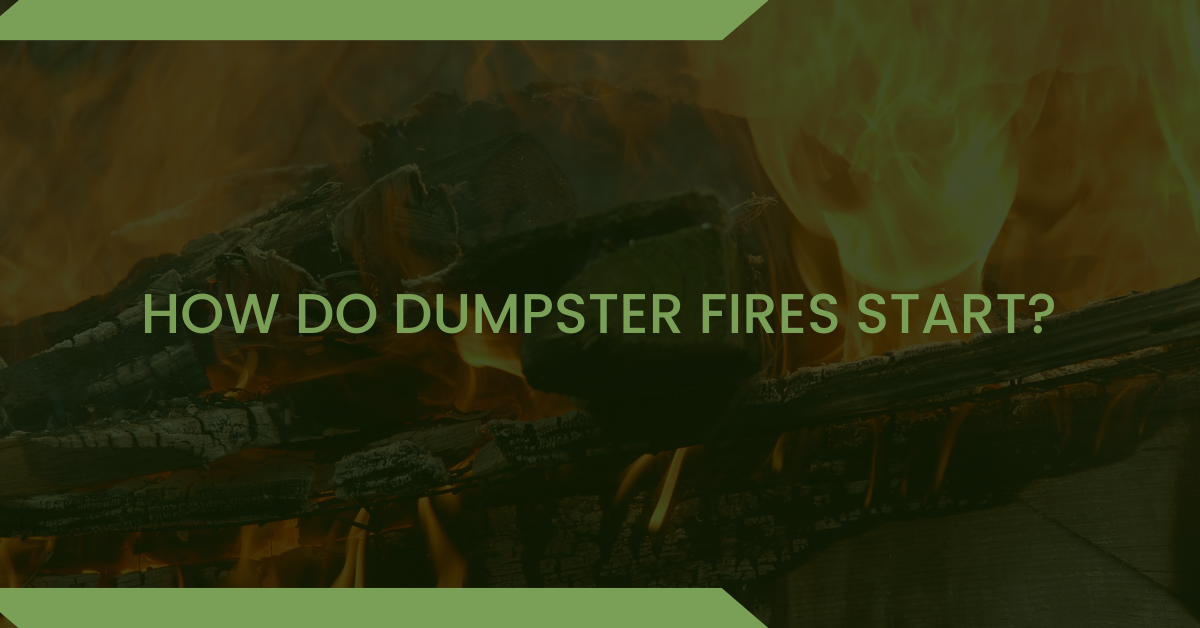Causes of Fire in a Dumpster
How do dumpster fires start?
It’s a question that has been puzzling mankind for centuries – how do dumpster fires start? Some say it’s from the sparks created when people throw out their trash, while others believe it’s due to the hot weather. But what is the honest answer? We will show you that below.
So next time you see a dumpster fire, don’t be too quick to judge – you may have been guilty of starting one yourself!
What causes fire in a dumpster?
You might not think twice about tossing that half-empty can of paint thinner into the dumpster. After all, it’s just trash, right? WRONG. That seemingly innocuous can of paint thinner is a ticking time bomb, just waiting to ignite and turn your whole dumpster into a blazing inferno.
Any materials that are flammable, combustible, or otherwise capable of starting a fire should never be thrown into the trash. This includes lighters, matches, aerosol cans, and even certain paper types.
Furthermore, even the most routine maintenance tasks can have dangerous consequences if you’re not careful. For example, a spark from welding or grinding can easily start a fire in your warehouse dumpster. And once that fire gets going, it can spread quickly, causing extensive damage to your property.
So, before you start any work that might create a spark, clear the area around the dumpster and have a fire extinguisher on hand, just in case. With a little bit of precaution, you can avoid a major disaster.
What can’t you throw in a dumpster?
Before renting a dumpster, you must understand what you can and cannot put in it. Disposing of hazardous materials improperly is not only dangerous, but it can also lead to hefty fines. After all, no one wants a load of hazardous waste and a hefty bill from the government.
So what exactly can’t be thrown in a dumpster?
1. Adhesives
Don’t put adhesives such as glue, epoxy, and other bonds in your dumpster because these items can bind other materials to the dumpster.
2. Polluted Soils and Absorbents
You are not allowed to put polluted soils and absorbents in your dumpster as these items can ignite dumpster fire.
We recommend contacting EPA or going to your nearby hazardous waste drop-off center to dispose of these things.
3. Hazardous Materials
You are not allowed to dispose of hazardous materials such as bottles and containers, pesticides, and motor oil in the dumpster. This includes pesticides, motor oil, automotive fluids, Freon, asbestos, etc.
4. Toxic Household Cleaning Fluids
While you are allowed to put cleaning supply bottles in your dumpster, you cannot put the actual solutions or liquids inside these bottles in your dumpster.
5. Used Water Tanks
You simply cannot throw hot water tanks into your trash bin. This is because hot water tanks have harmful gases that can explode due to various reasons.
6. Ink & Resins
Normal pen ink, printer ink, and resins can be harmful when you put them inside the dumpster. Therefore, you cannot throw these items in your dumpster.
7. Medical Infectious Waste
Medical infectious waste includes the substances and materials used to manufacture medicines. Usually, these items contain bodily fluids and are highly flammable, so you cannot throw these in your dumpster.
8. Non-Alkaline Batteries
Unlike standard batteries, some batteries are highly toxic and can cause a fire if you throw them in a dumpster. That’s why these batteries shouldn’t be disposed of in a dumpster.
9. Flammable Materials
All flammable materials like gasoline, propane tanks, used oil, fuel, and other flammable materials are not ideal for putting inside a dumpster as disposing of them is a severe safety risk and is not allowed in most states.
So, you should contact the fire department or hazardous waste collector when you want to dispose of flammable materials.
10. Paint and Lacquers
You cannot dispose of paint, thinner, lacquer, and wood stain removers in a dumpster as these items have lead or mercury and can cause severe dumpster fire.
11. Tires
You are not allowed to throw whole tires in landfills as they have hollow space and can gather methane gasses when you dispose of them with other garbage and due to the heat inside the dumpster.
12. Ashes and Cigarettes
Many dumpster fires are the result of tiny ashes and cigarette butts. Thus you cannot throw these items in a dumpster. If you want to dispose of these items, use plenty of water before throwing them into the dumpster. Never place these items directly in your dumpster.
How to prevent dumpster fire?
Dumpster fires are no joke. They can damage the environment and are also dangerous to people and property. So, in this section, let’s take a look at some ways to prevent dumpster fires:
Avoid Overfilling
Never overfill your bin, and ensure to check its trash level frequently. Overfilling the dumpster can cause various hazardous and unwanted results.
Be Careful about Spontaneous Combustion
Some toxic items and materials can immediately cause a fire. Some of these items are grass clippings, leaves, and compost. These items produce excessive heat while decomposing, leading to a fire.
Place Your Dumpsters in Secured Areas
The last way to prevent dumpster fire is to ensure that your dumpster is well-secured and placed in a safe area where no one can tamper. Besides, some bad people ignite dumpsters only for fun and other malicious reasons. Due to this reason, you should place the dumpster behind a protected gate or fence.
Last Verdict
So, there you have it. The anatomy of a dumpster fire. Now that you know how they start, take the necessary precautions to keep your business from going up in flames (figuratively speaking, of course). Implementing some simple safety measures can go a long way in preventing an unfortunate disaster.
So remember, when it comes to dumpster fires, prevention is critical. Please ensure you follow the guidelines to prevent dumpster fire.

